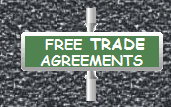  |
|
WHAT'S WRONG WITH THE (adapted from an alert by the
American Friends Service Committee) If
passed the THREATEN SMALL FARMERS. The agreement will favor only a small sector of Peruvian
farmers who export to the • THREATEN ACCESS TO LIFE-SAVING MEDICINES. While the amended text of the Peru FTA removes
the most egregious, CAFTA-based, provisions limiting the access to affordable
medicines, it still includes NAFTA provisions that undermine the right to
affordable medicines for poorer countries. • THREATEN WORKERS. Changes to the labor provisions are
insufficient. The Peru FTA allows discretion for FTA dispute settlement panels
to interpret and apply the terms of the ILO Declaration on Fundamental
Principles and Rights at Work differently than the Declaration has been interpreted and applied by the ILO itself.
Enforcement of the new changes will be dependent on the Peruvian Executive
Branch that has a consistent record of undermining domestic labor. THREATEN THE AMAZON. The Peruvian Amazon rainforest is already under attack by oil, gas,
timber, mining, and corporate agribusiness.
Investor rules under the free trade agreement will allow corporations to
sue the Peruvian government when enforcement of environmental laws results in
lost corporate profits. By contrast,
environmental groups are not granted the right to sue
corporations in international tribunals for violating multi-lateral
environmental agreements—only the anti-environmental Bush administration will
have that power. New rules • THREATEN
INDIGENOUS PEOPLES by
opening the way for large pharmaceutical and agribusiness corporations to
patent traditional knowledge, seeds, and life forms. This opens the door to
bio-piracy of the Andean-Amazon region and threatens the ecological, medicinal
and cultural heritage of indigenous peoples.
Oil corporations like Occidental Petroleum have a devastating history of
polluting the lands of indigenous communities and will be able to use the new
investor rights provisions of the agreement to continue their practices with
impunity. • THREATEN
WOMEN, CHILDREN, AND THE POOR. Provisions promoting the privatization and deregulation of essential
services such as water, healthcare and education are written
into this trade agreement. As these services become less accessible, women and
the poor would have to make up for increases in prices of these services. • THREATEN
FARM ANIMAL WELFARE, FOOD SAFETY, AND DRINKING WATER. As family
farms are displaced, the • THREATEN • THREATEN WILDLIFE. Rainforest logging in |















